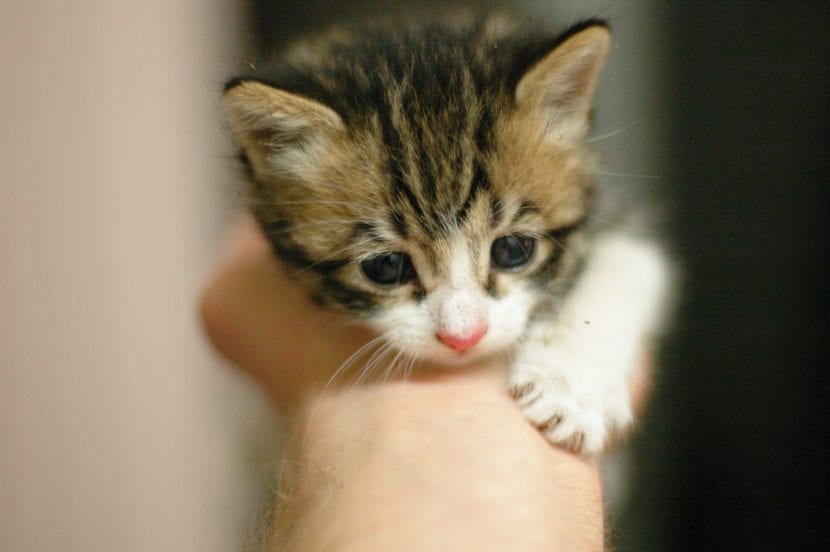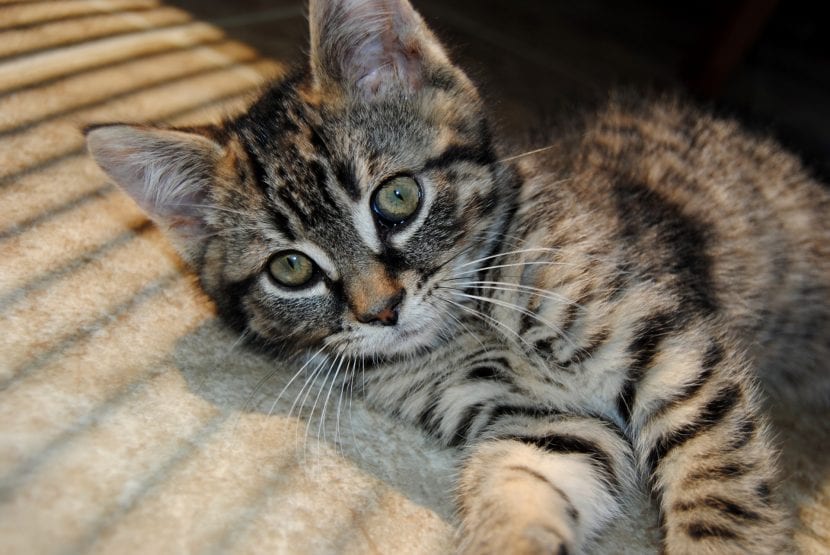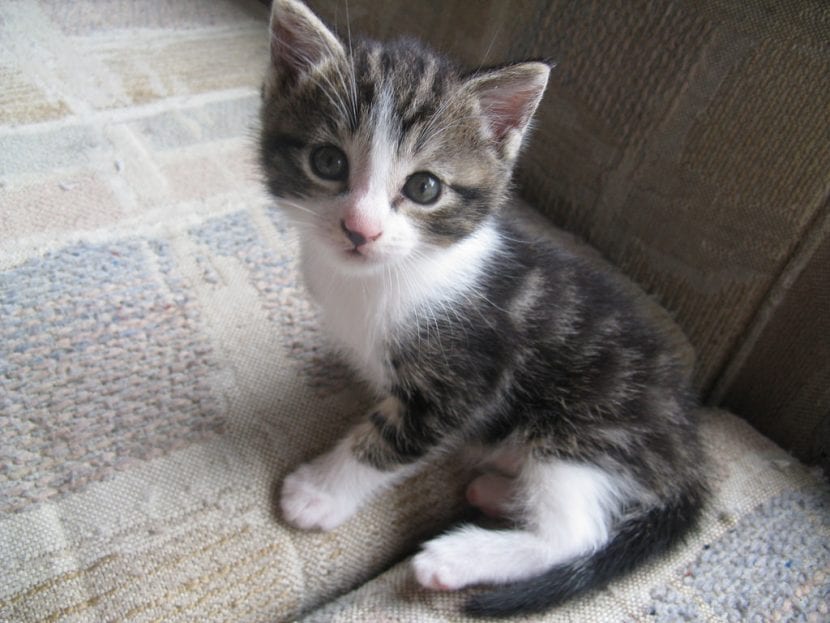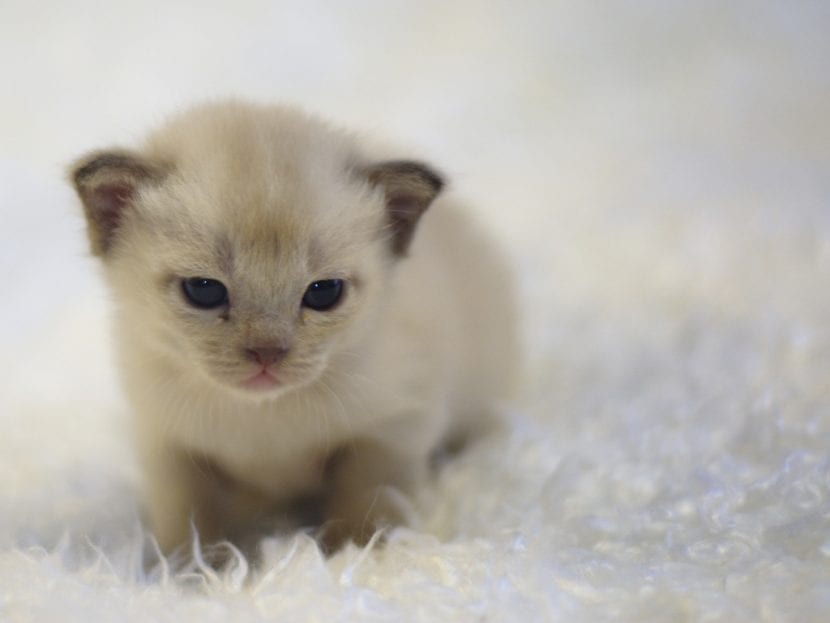
The young domestic feline can have a lot of trouble reaching adulthood. Your immune system, although it works at full capacity from the first moment you are born, still needs to be strengthened, but to do this, it must be exposed to viruses, bacteria and more. However, if basic care is not provided, or if the mother has infected him with a disease, any of these microorganisms can kill the animal.
For this reason, when we talk about diseases of kittens, the recommendation is always the same: go to the vet as soon as possible. You have to think that the kitten is very fragile, and if it catches, for example, Feline Immunodeficiency, it can have serious difficulties to recover enough so that it can lead a normal life. Knowing this, we are going to tell you what are the health problems kittens can have.
Diseases and infectious problems

Feline infectious anemia (AIF)
It is produced by the Cytauxzoon felis or by the Mycoplasma haemophilis, which attack the surface of the cat's red blood cells. It is transmitted mainly by fleas and ticks, through their bites, but it can also be passed from mothers to children.
- Symptom: loss of appetite and weight, increased hours of sleep, listlessness, gums and tongue become pale in color. It can also happen, in severe cases, that the heart beats faster than normal.
- Transmission: it is treated with antibiotics, or in severe cases with blood transfusion.
Calicivirosis (FVC)
It is a type of cat flu, transmitted by the Vesivirus virus. It is very infectious, to the point that, although the cat has already overcome the disease, it can contract it again since it is a virus whose strain mutates easily, adapting to each new situation.
- Symptom: colds, conjunctivitis, sneezing, ulcers on the palate and on the oral mucosa, runny nose, depression.
- Transmission: it is treated with antibiotics, analgesics and with medications that help the cat to breathe better.
Feline chlamydiosis
It is an eye infection caused by the bacteria Chlamydophila felis. This is a disease that can be easily confused with conjunctivitis, but it takes time to heal.
- Symptom: inflammation of the pink membrane that lines the inside of the eyelids and of the transparent membrane that covers the whites of the eyes, red eyes, watery or thick and purulent tears, sneezing, runny nose, fever and loss of appetite .
- Transmission: it is treated with antibiotics.
Conjunctivitis
It is the inflammation of the lining of the eye. It can appear for various reasons, due to bacteria, fungi, trauma, hereditary problems.
- Symptom: itchy eyes, abundant tearing, excess of lagañas, a lot of tearing.
- Transmission: clean the eyes with a clean gauze for each eye with chamomile. If there is no improvement in 3-4 days, it should be treated with an eye drop recommended by the veterinarian.
Feline immunodeficiency (FIV)
It is a disease transmitted by a virus that affects the immune system, giving or destroying white blood cells. It can be passed from mother to child, during breastfeeding, or through bites.
- Symptom: malaise, fever, loss of weight and appetite, gingivitis, apathy.
- Transmission: sadly, it is only symptomatic. Antibiotics will be given so that you can lead as normal and long a life as possible.
Other illnesses or problems

Abscesses
They are lumps that sometimes appear when a wound becomes infected and the skin closes before it has finished healing.
- Symptom: lack of appetite, apathy, appearance of a palpable lump.
- Transmission: clean the area with a gauze soaked in warm water, until the pus comes out. Afterwards, it is cleaned with hydrogen peroxide. Do not bandage the area.
Acne
Although it is not frequent, the kitten may have pimples on the chin and / or in the mouth due to being allergic, or due to a poor diet.
- Symptom: appearance of pimples.
- Transmission: wash the area with mild soap, rinse and dry well.
Allergy
The kitten, unfortunately, can also have allergies: to pollen, dust, detergents, etc.
- Symptom: respiratory problems (coughing, sneezing, shortness of breath, runny nose), watery eyes, itching.
- Transmission: you have to keep it away from what causes allergies.
Bronchopneumonia
It is a lung infection that is usually caused by viruses and is aggravated by bacteria. They attack the bronchi and the pulmonary alveoli.
- Symptom: cough, fever, trouble breathing, purulent nasal discharge.
- Transmission- Antibiotics and medications to help expel microorganisms through coughs and mucus.
Hair loss
In kittens it is not common, but if it occurs it may be because they are being fed an inadequate diet, or by external parasites.
- Symptom: hair loss, itching.
- Transmission: give him a diet rich in animal protein, and treat him with antiparasitics.
Dandruff
If there is an excess of dandruff it may be due to a poor diet or the presence of parasites.
- Symptom, appearance of whitish particles on the hair, itching.
- Transmission: improve the diet, and put antiparasitics that fight fleas, ticks and also mites.
Colic
They are spasmodic contractions of a viscera, which cause a lot of pain.
- Symptom: apathy, loss of appetite, localized pain.
- Transmission: it is treated with antispasmodics.
Diarrhea
Diarrhea is common in kittens: it appears when the food is not changed little by little, or by the presence of intestinal parasites.
- Symptom: increase in the frequency of defecation, and in the intake of water.
- Transmission: keep him hydrated, give him a pill or syrup to eliminate intestinal parasites, and feed him with good quality food.
Pharyngitis
It is the inflammation of the throat by, normally, infectious agents.
- Symptom: coughing fits, fever, tiredness, swallowing problems.
- Transmission- Feed him soft and tasty foods, such as kitten cans, and keep him away from drafts.
Otitis
It is the inflammation of the internal structure of the ear, which is caused by bacteria, fungi, parasites or accidents (bad falls, for example).
- Symptom: tries to scratch ear, keeps head on one side.
- Transmission: Treating it with an ear drops is usually sufficient, but it may be necessary to administer antibiotic medications by mouth.

Illnesses in kittens can be very serious. In the event that you suspect that your little friend is unwell, don't hesitate to ask for professional help.
Hello, I have a baby kitten that is about 4 weeks old and I don't know what's wrong with him. Yesterday suddenly he could not move and I left him as I left him, he turns to his side, he has had seizures, he does not want to eat or drink water ... I do not understand what is wrong with him and I am very worried because it seems something serious and I do not want anything to happen to him since it is very small. I have taken him to the vet and they do not know what can happen to him although they do not think that he will improve. I don't want to give up so if someone could give me a second opinion I would really appreciate it. Thanks.
Hi Alexandra.
I am very sorry for what happens to the kitten, but I am not a veterinarian.
I would recommend you take it to another, or else consult with the professionals at barkibu.es
I hope it gets better.
Much encouragement.